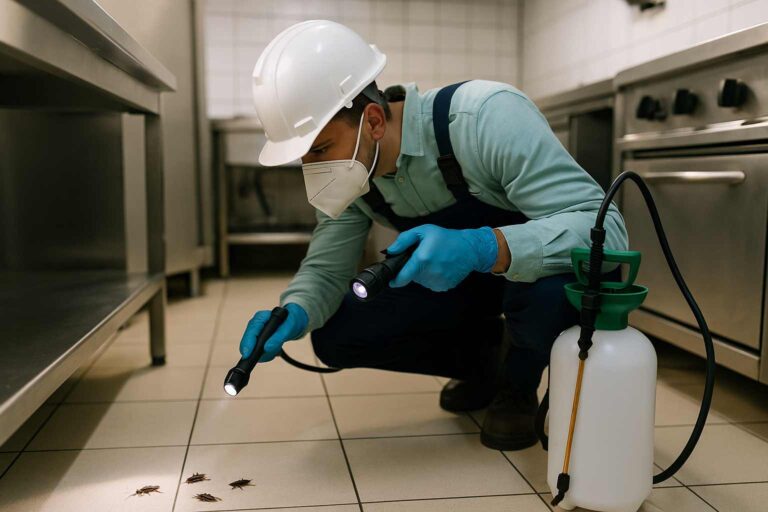Let me tell you something important.
Health inspectors don’t play around when it comes to pests in your building.
They walk in and their eyes go straight to those corners, those baseboards, those little spots where evidence might be hiding.
One tiny dropping or a single cockroach can shut you down faster than you can say “but we clean every night.”
I’ve seen it happen so many times.
A restaurant owner thinks they’re on top of things, then bam.
Failed inspection, customers walking away, reputation tanking. Nobody wants that nightmare.
Commercial spaces need serious pest management.
It’s not like your house where maybe you can deal with the occasional ant invasion yourself.
When you’re running a business, especially one that handles food or serves the public, the stakes get way higher.
7 Tips Why Commercial Pest Control Is Key To Maintaining Health Code Compliance
Let’s break down why professional pest control isn’t just nice to have—it’s absolutely critical for keeping your business running and your health inspector happy.
Understanding Health Code Compliance
Health codes aren’t suggestions.
They’re rules with teeth.
Every state has them, every county enforces them, and they all take pest management super seriously.
When you look at any health code document, pest control shows up repeatedly.
There’s usually whole sections dedicated to preventing and managing pests.
They spell out requirements about sealed entry points, proper waste management, and regular inspections.
The codes exist for good reasons.
They protect customers from getting sick, they protect workers from unhealthy conditions, and honestly, they protect your business from nasty surprises.
You gotta know what your local health department expects.
Get familiar with the specific rules in your area.
Some places are stricter than others, but all of them will ding you for signs of mice, rats, roaches, flies, or stored product pests like weevils and moths.
The Risks Posed by Pests in Commercial Environments
Pests aren’t just gross.
They’re dangerous to your bottom line in ways you might not have considered.
Rodents chew through wiring and can cause fires.
They contaminate surfaces with urine and droppings.
One mouse can leave thousands of micro-droplets of urine as it runs around your space at night. Gross, right?
Cockroaches spread bacteria like crazy.
They walk through filth, then crawl over food prep areas, dishes, and equipment.
They trigger asthma and allergies too.
Flies might seem less threatening, but they vomit on food every time they land on it.
That’s how they eat. They’re basically little vomit machines spreading germs everywhere.
Food businesses face the biggest risks, but any commercial space can suffer.
Retail shops, offices, warehouses—pests don’t discriminate.
They’ll happily infest anywhere that offers food, water, and hiding spots.
Reputation damage hits hard too.
One customer spotting a roach or mouse can trigger bad reviews that chase away business for months or years.
Trust me, people remember pest sightings way longer than they remember good service.
How Commercial Pest Control Ensures Compliance
Professional pest control companies know the health codes inside and out.
They’re not just killing bugs—they’re making sure you meet all requirements.
The big difference between DIY and professional approaches? Documentation and prevention. DIY might kill some bugs, but pros create systems that keep pests away long-term and provide records proving your compliance efforts.
Good pest control services give you detailed reports after every visit.
These reports show what they checked, what they found, what they did about it, and recommendations for preventing future problems.
When the health inspector asks for your pest management records, you’ll have everything ready.
They also use commercial-grade products and techniques that work better than anything you can buy at the hardware store.
Their treatments target specific pests without risking contamination of food or surfaces.
Regular scheduled visits catch problems early.
The technician might notice signs of pests that you’d miss until the problem got way worse.
Early detection saves money and prevents compliance issues.
Thus, commercial pest control becomes an essential step in protecting operations and ensuring a property remains compliant with required health standards.
Consequences of Ignoring Pest Control for Businesses
Ignoring professional pest management can cost you big time. Like, business-ending big.
Health inspectors can shut you down on the spot if they find serious pest issues.
That means lost revenue every day you’re closed.
They can also issue fines that stack up fast, especially for repeat violations.
If customers get sick from food contaminated by pests, you’re looking at potential lawsuits.
Those can bankrupt small businesses quickly.
The reputation hit? Almost impossible to calculate.
One bad health inspection report goes online these days.
Then people share it on social media, and suddenly everyone in town knows about your mouse problem.
I remember a bakery that tried saving money by handling pest control themselves.
They missed signs of a growing rodent problem until a customer found droppings on their plate.
Six months later, they were out of business.
The savings weren’t worth it.
Some business insurance policies won’t cover damages caused by pests if you didn’t have proper pest management in place.
That’s a nasty surprise nobody wants.
Benefits of Routine Commercial Pest Control
Regular professional pest control gives you much more than just compliance.
First, you get peace of mind.
You sleep better knowing experts are handling this critical aspect of your business.
Your staff can focus on their actual jobs instead of worrying about pests.
Prevention costs less than reaction. Much less.
Treating a full-blown infestation can cost thousands, while prevention might run a few hundred dollars per quarter.
Most providers offer guarantees.
If pests show up between scheduled visits, they’ll come back at no extra charge. Try getting that guarantee from a DIY spray can.
Customer confidence stays high when your space is visibly clean and pest-free.
People notice the little things, like how your baseboards look and whether flies are buzzing around.
Staff morale improves too.
Nobody wants to work somewhere with pest problems.
Your employees appreciate knowing you take their work environment seriously.
The best benefit? You barely have to think about pests.
The pros handle everything, letting you concentrate on running your business.
Choosing the Right Commercial Pest Control Provider
Not all pest control companies are the same.
You need one with specific commercial experience, especially in your industry.
How long have you worked with businesses like mine? Can I see sample reports? What certification do your technicians have? Do you understand my industry’s specific health code requirements?
Look for companies that offer integrated pest management (IPM), not just spraying chemicals.
Good IPM programs focus on prevention through exclusion, sanitation, and monitoring, with chemicals as a last resort.
Check if they use modern technology for tracking and reporting.
The good ones have apps or online portals where you can access all your service records anytime.
Get references from similar businesses.
Call them and ask about response times and effectiveness.
A company that’s great at handling homes might not be equipped for commercial spaces.
Make sure they’re willing to work around your schedule.
Restaurants need service after hours. Offices need weekend visits.
The right provider fits into your operation, not the other way around.
Best Practices for Maintaining a Pest-Free Facility
Even with great professional help, your daily practices make a huge difference in keeping pests away.
Train your staff to spot and report signs of pests.
They should know what mouse droppings look like, or the shell casings roaches leave behind. Early detection prevents bigger problems.
Keep food storage areas immaculate.
Rotate stock regularly using the first-in, first-out method.
Store everything at least six inches off the floor and away from walls.
Seal entry points religiously. Mice can squeeze through gaps as small as a dime.
Roaches can fit through cracks the width of a credit card.
Caulk, door sweeps, and screens on vents are your friends.
Manage your trash carefully.
Dumpsters should be at least 20 feet from building entrances. Inside trash should go out frequently and bins should be washed regularly.
Fix water leaks and drainage issues promptly.
Pests need water even more than they need food.
A dripping pipe is like ringing the dinner bell for roaches and rodents.
Clean deep and often. That means moving equipment to clean underneath, scrubbing inside cabinets, and not just surface cleaning.
Grease buildup and food particles in cracks feed pests for months.
Conclusion
Getting serious about commercial pest control isn’t just about passing your next health inspection. It’s about protecting everything you’ve worked for.
When health inspectors see you have professional pest management with good documentation, they know you’re serious about compliance.
That relationship with inspectors matters more than most business owners realize.
The right pest control program becomes part of your business foundation.
It protects your customers, your employees, your property, and your reputation.
Don’t wait for a problem before calling the pros. By then, you’re already behind and potentially at risk of violations.
Prevention beats reaction every single time.
Your business deserves protection from the damages pests can cause.
Your customers deserve a safe, clean environment. And honestly, you deserve to sleep at night without worrying about what might be scurrying around your business in the dark.
Smart business owners make professional pest control a non-negotiable part of their operation.
It’s an investment that pays for itself many times over in prevented problems and continued compliance.



